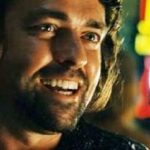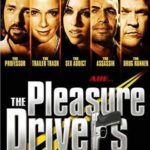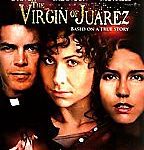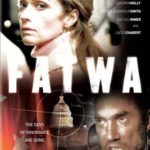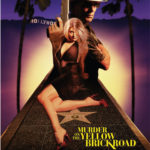by Natasha Stoynoff, Toronto Sun
Angus Macfadyen does battle with his dark side in ‘Warriors Of Virtue’.
HOLLYWOOD – Angus Macfadyen is quietly grappling with the good and evil within.
As Komodo, a sinister yet charming warlord in the action/fantasy flick ‘Warriors Of Virtue’, opening Friday, the twenty-something actor wore pale makeup, an Elvira-dark wig and devilish robes, then took an introspective look in the mirror.
“Suddenly, there’s this strange creature looking back at me, saying, ‘Hello! I’m your shadow,'” cackles the actor, “‘and you haven’t been playing with me lately! Come out to PLAY!'”
Fortunately, battling one’s inner dark side is just the kind of moral struggle Macfadyen specializes in – both professionally and personally.
Making his feature debut in Mel Gibson’s Oscar-winning ‘Braveheart’, the fetching Macfadyen excelled as the conflicted Scottish nobleman who betrays, then befriends, good guy Gibson in his revolt against the British.
More recently in the can is ‘Snide And Prejudice’, in which he plays a mentally ill man who thinks he’s Adolph Hitler.
“It’s a bit like being a drunk,” he says, of his “addiction” to playing characters on the edge.
“Once you’ve been there, you don’t want to go back.”
On the surface, ‘Warriors’ is about a boy (Mario Yedidia) transported to a mystical land of animal-human inhabitants fighting (with martial arts and a dose of Taoism) for survival.
But it really symbolizes “the fight between light and (darkness),” says the philosophical actor.
The good guys – five kangaroo-looking warriors each endowed with a virtue in classic Chinese tradition (benevolence, righteousness, order, wisdom and loyalty) – try to defend their people without actually killing the bad guys.
In the end, young audience members are to learn, “the only demons in this world are in your own heart,” says Macfadyen. “That’s where all the battles must be fought.”
Macfadyen’s own spiritual quest began in Scotland, where, “I was an angry kid who didn’t understand myself or the world,” he says. “Then I began to acquire bits of wisdom here and there.”
Growing up in a family that moved around (dad worked for the World Health Organization), he learned life lessons in locales such as Africa, France, the Philippines and Singapore.
Ideal training for the nomadic lifestyle of an actor, he agrees, since “now, I can’t settle down for very long in one place.”
But still scant preparation for his two-month ‘Warriors’ shoot in Beijing.
“It was a very rough, raw place,” he says.
Even the man-made set of turquoise waterfalls and breezy, surreal forestry – a lavish Garden of Eden – was hell to work with.
“The whirlwind of leaves and dust got in our mouths and noses,” he grimaces, “it was just disgusting. They’d turn on the fans, and I’d think, ‘No more! Let me go home!'” (Some exteriors were shot in North Vancouver.)
Adding to the stress was the sub-zero temperatures of the soundstage, fixed for those actors wearing 40 pounds of unyielding, hot, plastic ‘kangaroo’ costumes.
On days off, Macfadyen took refuge in a Shaolin monastery, observing monks in meditation.
“For them, it’s their direct expression to the universe,” he says, in awe.
“They practise this eight hours a day and they’re not doing it to sell something to somebody. It was incredible to see because it was so pure.”
Fitting research for ‘Warriors’, he notes, since it’s a film “with a soul.”
The love-brainchild of the four Law brothers, all Colorado medics born in Hong Kong who shared a notion to make “a family film with a positive message,” the siblings put up $36 million for their first venture as movie producers.
“At first, everybody was stepping on everybody’s feet just like dancers learning to dance with each other,” says Chris Law, a plastic surgeon. “But we turned from a clumsy dance team to a tag team.”
Along with acclaimed Hong Kong director Ronny Yu (‘The Bride With White Hair’), the team agreed on a common goal for their youthful audience: more morale, less violence.
“The cinema is a medium with great impact,” says Yu. “I feel responsible for the message I send out.”
Using 27 masks, 200 pairs of hands, and 120 pairs of feet, special effects guy Tony Gardner “walked a fine line between what is scary and what is accessible,” he says, while constructing the motorized faces and bodies of the kangaroo warriors.
“We were constantly softening their features,” he says, conscious that they should appear non-threatening to kids.
And using stop-time cinematography, says Yu, gave a “fantasy, surreal quality that made the action less violent, more artistic.”
Added artsy stuff came from Macfadyen, an English/French graduate from the University of Edinburgh, who wrote some poetry (“Life is but a dream … flowing to another dream …) into his prose.
“I wanted to make (Komodo) a poet and a philosopher,” he explains, “exciting and enticing enough to mesmerize this young boy.”
With starring roles in four upcoming Hollywood movies, plus current heartthrob status in Britain (due to several BBC productions that showcased the actor’s saucer-blue eyes), Macfadyen’s own head should be turning.
But while his career is moving at full speed, his personal life retains a Zen-like stillness.
“I paint, I write, I live,” he says, “and I drink a good bottle of wine at the end of the day.”
Now transplanted to L.A., though, the peace never lasts for long.
He’s working on a script which he’ll direct that asks the questions: “What is success and failure?” and, “In order to be an artist, must you be tortured?”
Next month, he begins shooting ‘Death Valley’ [‘Facade’] with Eric Roberts in Las Vegas.
“It’s about an insane Frenchman who tries to rebuild the Versailles palace in the middle of the desert to make it into a gambling casino,” he laughs, adding, “he’s mad.”
Right up Macfadyen’s alley.

